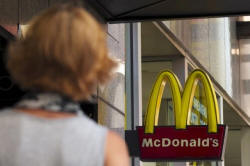|
 EU
to investigate McDonald's tax deals with Luxembourg EU
to investigate McDonald's tax deals with Luxembourg
 Send a link to a friend
Send a link to a friend
[December 03, 2015]
By Foo Yun Chee
BRUSSELS (Reuters) - EU antitrust
regulators will investigate McDonald's tax deals with Luxembourg which
enabled the U.S. fastfood chain to escape paying taxes on European
franchise royalties from 2009, in a move which could lead to hefty back
taxes for the company.
|
|
 The action by the European Commission comes two months after it
ordered Luxembourg to recover up to 30 million euros ($32 million)
from Fiat Chrysler Automobiles and the Dutch to do the same for
Starbucks because their tax deals were seen as unlawful aid. The action by the European Commission comes two months after it
ordered Luxembourg to recover up to 30 million euros ($32 million)
from Fiat Chrysler Automobiles and the Dutch to do the same for
Starbucks because their tax deals were seen as unlawful aid.
The EU competition enforcer said McDonald's had not paid any
corporate taxes in Luxembourg or the United States on royalties paid
by franchisees in Europe and Russia since 2009 as a result of two
tax rulings by the Luxembourg authorities.
"A tax ruling that agrees to McDonald's paying no tax on their
European royalties either in Luxembourg or in the U.S. has to be
looked at very carefully under EU state aid rules," European
Competition Commissioner Margrethe Vestager said.

"The purpose of double taxation treaties between countries is to
avoid double taxation - not to justify double non-taxation."
Luxembourg's finance ministry said the country had granted no
special tax treatment nor selective advantage to McDonald's and that
it would cooperate fully with the investigation.
McDonald's said it complied with all tax rules in Europe and that
its companies had paid more than 2.1 billion euros in corporate
taxes in the European Union from 2010 to 2014, with an average tax
rate of almost 27 percent.
It also paid social, real estate and other taxes, while its
independent franchises, operators of about 75 percent of its
outlets, paid corporate and other taxes.
"We are confident that the inquiry will be resolved favorably," it
said in a statement.
TWIN RULINGS, NO TAX
The Commission said McDonald's Europe Franchising was exempted from
paying taxes on this income in Luxembourg on the grounds that the
profits were subject to taxation in the United States. However, when
the ruling was granted in 2009, these profits were not subjected to
tax in the United States.
[to top of second column] |

In a second ruling, Luxembourg agreed that McDonald's did not have
to prove that this income was subject to U.S. tax, the Commission
said.
Luxembourg, the Commission said, exempted the profits from taxation
there despite knowing that they were in fact not subject to tax in
the United States.
The case presents yet another headache for Commission President
Jean-Claude Juncker as Luxembourg developed its favorable tax system
during the near quarter-century that he served as the Grand Duchy's
finance minister or prime minister.
Vestager's move against McDonald's came following critical media
reports and evidence from trade unions.
"For too long, McDonald's has stashed billions in tax havens and
ducked contributing to state coffers ... and itís time that the
company be held accountable" Scott Courtney, organizing director at
SEIU, said in a statement.
SEIU represents 2 million healthcare, public sector and property
service workers in the United States, Canada and Puerto Rico.
($1 = 0.9471 euros)
(Reporting by Foo Yun Chee; Editing by Philip Blenkinsop and Mark
Potter)
[© 2015 Thomson Reuters. All rights
reserved.] Copyright 2015 Reuters. All rights reserved. This material may not be published,
broadcast, rewritten or redistributed.
 |